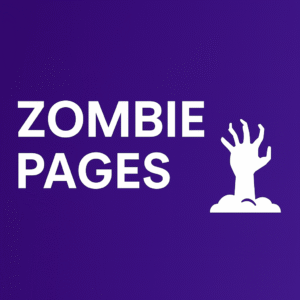What Is a Zombie Page & How It Affects Your SEO Performance
In the vast ecosystem of the internet, not all pages on a website contribute equally to visibility, traffic, or search engine ranking. Among the many underperformers that can silently harm a site’s SEO health, zombie pages are some of the most insidious. But what exactly are zombie pages, and why should site owners care about them?
Defining Zombie Pages
A zombie page refers to a webpage on a site that adds little to no value — either to users or search engines. These are the pages that sit dormant, receiving minimal traffic, generating no engagement, and offering stale or thin content that lacks relevance or depth.
They often arise unintentionally. Over time, as websites expand, pages are added for products, categories, tags, or temporary campaigns, and once their purpose fades, they are left behind indexed by Google, but virtually invisible to users.
Common Types of Zombie Pages
While the term “zombie page” is figurative, the kinds of pages it describes are concrete:
- Outdated blog posts or news articles: Especially those tied to short-term events or trends that no longer hold interest.
- Thin product pages: Items that are out of stock, discontinued, or lacking sufficient descriptions.
- Duplicate or near-duplicate content: Pages that repeat the same information with little differentiation.
- Empty category or tag pages: Generated by CMS systems when categories or tags exist without substantial content to back them.
- Poorly crafted landing pages: Built for past marketing campaigns with no current relevance or traffic.
How Zombie Pages Hurt SEO
Zombie pages dilute the SEO strength of a website in multiple ways:
1. Wasted Crawl Budget
Google allocates a crawl budget, the number of pages it crawls on your site within a given timeframe. If crawlers spend time on unimportant zombie pages, they might miss newer, more important content that deserves indexing.
2. Index Bloat
When search engines index a large number of low-quality pages, it can result in index bloat the presence of too many irrelevant URLs in Google’s index. This reduces the overall authority of your site because search engines may interpret the site as cluttered or poorly maintained.
3. Lowered Site Authority and Quality Signals
Google values quality over quantity. A website teeming with irrelevant or low-quality content sends poor signals to Google’s algorithms. This can indirectly reduce the overall trustworthiness of the domain, affecting the ranking of even the high-quality pages.
4. User Experience Decline
Visitors stumbling upon outdated or thin pages may quickly bounce, increasing the bounce rate and decreasing time-on-site both of which are behavioral signals that search engines factor into ranking decisions.
How to Identify Zombie Pages
Detecting zombie pages requires thorough auditing. Here’s how professionals approach it:
- Google Search Console (GSC): Inspect pages with low impressions, clicks, and high bounce rates.
- Google Analytics: Analyze pages with negligible traffic over an extended period.
- Crawling Tools: Software like Screaming Frog, Ahrefs or Semrush can flag pages with thin content, duplicate issues, or poor optimization.
- Content Inventory Review: Periodically review all content types — blogs, product listings, tags to determine relevance.
What to Do About Zombie Pages
Eliminating or revitalizing zombie pages depends on their potential:
- Update or Enrich: If a page holds some potential, enhance it with updated content, better images, or multimedia to improve engagement.
- Consolidate: Merge similar pages to create a comprehensive, valuable resource.
- Redirect: Use 301 redirects to point the zombie page to a more relevant or updated page, preserving any residual SEO value.
- De-index: Apply the noindex tag to instruct Google not to index that page if deletion isn’t an option.
- Delete: If the page serves no purpose and cannot be salvaged, removal is often the best course.
Regular SEO Hygiene
Maintaining a healthy website is not just about creating new content — it’s equally about managing existing content. Zombie pages are the dead weight that can quietly anchor your SEO performance. By routinely auditing your site, identifying these low-value pages, and taking corrective actions, you help ensure that your site remains optimized, relevant, and competitive in search rankings.
Ultimately, a leaner, higher-quality site sends better signals to search engines and provides a richer experience for your users the dual cornerstone of sustainable SEO success.
Frequently Asked Questions
While zombie pages themselves may not directly slow down your website’s loading speed, having too many of them can increase server load, especially during site-wide operations like backups, indexing, or migrations. This can indirectly affect performance, especially on large sites with limited server resources.
Google doesn’t issue direct penalties for zombie pages, but their presence can degrade your site’s overall quality signals. Algorithms like Google’s Panda update focus on site quality; thus, an abundance of thin, low-value pages can lower the site’s authority and ranking potential across all pages.
For dynamic or content-heavy sites, it’s advisable to conduct a content audit every 6 to 12 months. Smaller sites might audit annually. Regular audits help identify not just zombie pages but other SEO issues like broken links, outdated information, and duplicate content.
Yes, e-commerce sites are particularly vulnerable to zombie pages through out-of-stock products, seasonal listings, and auto-generated category pages. Without proper management, these pages can accumulate quickly, leading to index bloat and diluting SEO performance for high-priority product pages.

Book a Strategy Call
Author
George is the CEO of Briefstorm Digital and a AI marketing expert. When not planning strategies or implement AI techincs, he hits the gym and plays sports.
Recent Posts

